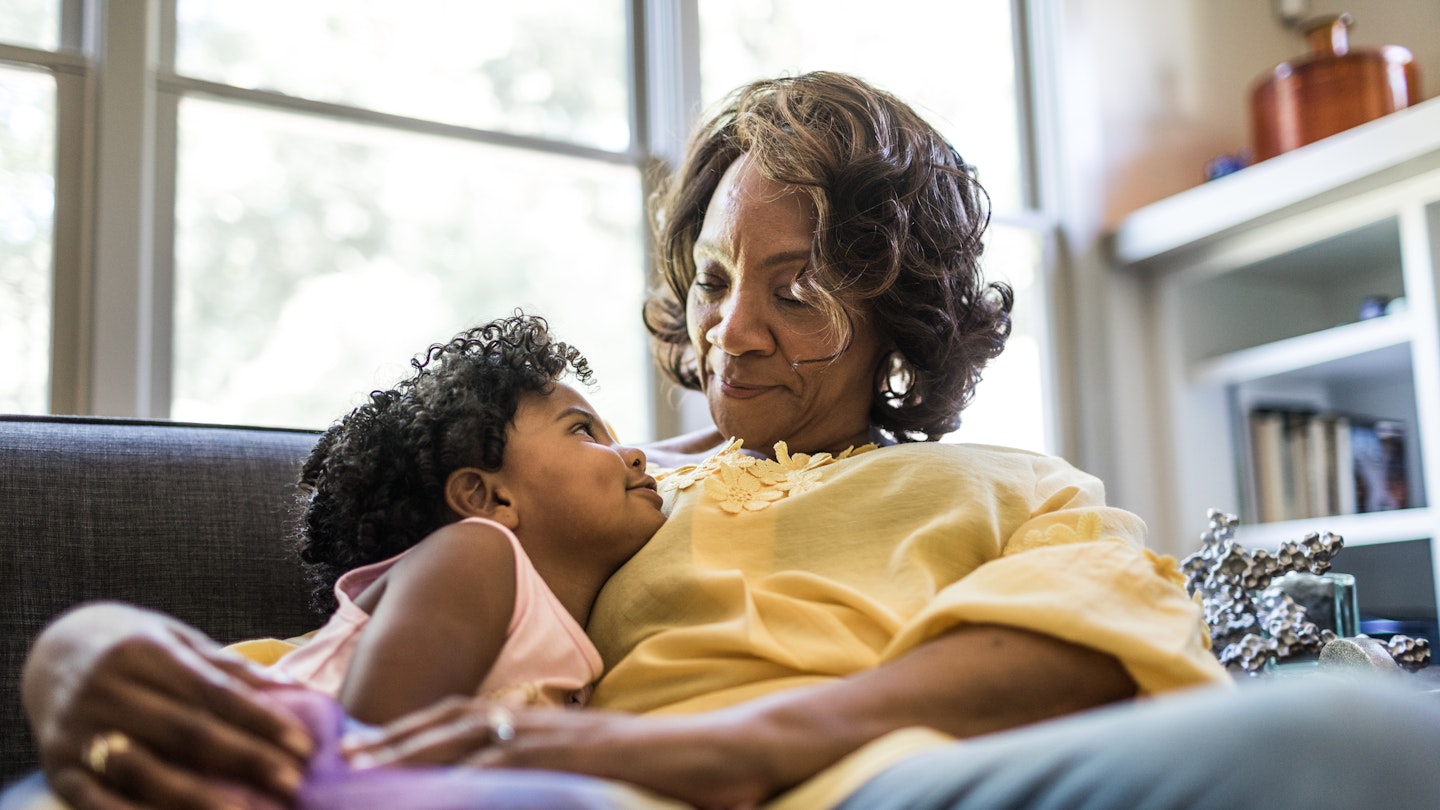There's nothing more heartbreaking as a grandparent than being denied access to your grandchildren. Novel's such as Milly Johnson's Sunshine Over Wildflower Cottage features a character who is struggling to get access to her grandchildren, and sadly this situation is far from fictional for many grandparents.
Do grandparents have rights in the UK?
Currently, grandparents do not have a right to see their grandchild in England and Wales. It's also not possible for grandparents to gain parental responsibility by applying for a Parental Responsibility Order.
Why are some grandparents denied access to their grandchildren?
It is a sad fact that some parents will deny their children access to their grandparents for various reasons. Sadly, despite what you might think, grandparents do not have automatic rights to see their grandchildren.
“The most common reason for grandparents not to see their grandchildren is relationship breakdown," explains Helen Bowns, legal director in the family team at law firm, Shakespeare Martineau. For example, it could be that their child’s relationship has ended on rocky terms and so the grandparents no longer see their grandchild. It may also be that the relationship between the grandparents and their own child has broken down and they are prevented from spending any time with their grandchild as a result.”
What if the child’s parents have separated or one or both of the child’s parents have passed away?
If there has been a nasty break-up in the family, small, tactful steps are needed to move forward, however much you might be desperate to see them. Keep a lid on those heated emotions when you make contact. Remember this is about being able to have time with the child, not blaming their parents, so always keep that in focus. Gently suggest that your grandchild might benefit as much from seeing you, as you would from seeing him or her.
“If a grandparent does not see their grandchild because of separation or the death of parents, the same provisions still apply, no matter how harsh this may seem," says Helen. "As with any other situation where a grandparent can’t see their grandchild, they can make an application to the court, once they have had permission to do so, and hope that it will be granted.”

Can grandparents apply to the courts for access to grandchildren?
If parents and grandparents are unable to reach an agreement, some grandparents may choose to take their case to court, in hope of being allowed contact with the child or children.
While only people with parental responsibility can apply for a court order, grandparents can apply for permission to apply for a Court Order to seek contact with the grandchild. It is unlikely this would be refused.
What things will the court consider at a hearing?
Everything from the grandparent's relationship with the grandchild to the nature of the application will be taken into consideration at a hearing. They'll have to think if contact with the grandparents would be harmful in any way to the child and if continuing the contact with the grandparents would impact negatively on the rest of the family.
If any objections are raised by a parent, you will have to attend a full hearing where each party provides evidence.
For legal advice, visit Rayden Solicitors, experts in family law.
Top tips
Try to keep the peace
Despite the desperation this causes, it can be a huge and costly mistake for the first step of action to be engaging a solicitor to force a parent into giving you access, because the parent is likely to feel threatened and dig their heels in even further. Let legal proceedings be the very last resort and not at all if you can help it.
"Grandparents do not have legal rights to see their grandchildren but parents do have legal rights to decide who their children should see, so the less inflammatory you can keep negotiations, the better," says author Milly Johnson.
"Friends of mine, who are being denied a proper relationship with their young grandson, inspired the storyline in my book and it’s been sad to see how heartbroken they are by the situation and terrified at putting a foot wrong. They are effectively being held to ransom by their ex-daughter-in-law, after a bitter split with their son. But they have made a little headway, albeit with a lot of tongue-biting."
"I would also suggest that you document every attempt you make to bridge the gap. That will help you keep a clear picture on what you have tried and what the result of your efforts has been," suggests Milly. "If you’re getting absolutely nowhere, is there a neutral third party that can act as an intermediary? That could be your most effective tool. Be prepared to graciously accept any tidbit of contact which a parent allows you to keep you in the child’s life."
Don't be drastic
“It must always be remembered that the court should be the last point of call. Before turning to a legal solution, grandparents should first try and speak to the parent that is preventing contact with the grandchild," recommends Helen. "By explaining that sides are not being taken and that you just want to be there for the benefit of the child, the parent may begin to understand the importance of continuing the grandparent/grandchild relationship and in turn change their mind about access."
“However, this is unlikely to cause an immediate change of attitude," says Helen. "As such, it’s vital not to threaten legal action after only one or two conversations, as this could increase tensions unnecessarily. Of course, the grandchild’s welfare must remain at the core of the matter, so it’s best to keep them away from any interactions that have the potential to get heated.”

Consider family mediation
Although emotionally testing for all parties involved, sometimes a long, adult discussion overseen by a separate party may be what is needed to progress.
“If initial conversations do not go to plan, then it might be a good idea to invite the parent to mediation to see if matters can be resolved that way, or alternatively, ask another family member to assist in resolving the conflict," suggests Helen. "Only after these options have failed should the grandparents consider making an application to the court."
“All court proceedings can be stressful, for both the grandchild and the adults involved, and therefore it is important that it is a well-thought-out application and all other avenues have been considered beforehand. It is also wise to speak to a family lawyer about the case early on to receive the most suitable guidance possible for the specific situation.”
Think carefully if you want to engage a solicitor
If all else fails and you insist on seeing a solicitor, remember this can be a long, complicated and expensive course. Do keep in mind that if such a case goes all the way to court, the welfare of the child will be the key issue, not your feelings, even if courts do appreciate the value of contact with the extended family. And if the court decides to reject your application, you’ll probably be back to minus square one with the parent.
"If the relationship between the grandparents and the parent with whom their grandchild is living has broken down and they are not able to see the grandchild then they can consider applying for a Child Arrangements Order from the court," explains Helen. “Before a grandparent can make this application, they need to ask for the court’s permission, as they do not have an automatic right in the same way that parents do. Thankfully, the court recognises the importance of the role of grandparents in the lives of children and permission is usually granted to make the application.” If you obtain a Child Arrangements Order to see your grandchild and their parent does not adhere to this order then you can return the matter to court and request that the order is enforced.
Sadly, grandparents are reliant on the decision on the parent and where there has been a breakdown of a family relationship, it can take an infuriating age to build back up. One day there will be a landmark court case that will change the landscape of how the estrangement of children from their grandparents is dealt with, but for now the only real course is a softly softly conciliatory approach with feelings reigned in – and fingers crossed.
To connect with other grandparents who have been denied access to their grandchildren, have a look at this Facebook community.
Popular articles to read next
Can grandparents provide childcare and hug their grandchildren during coronavirus restrictions?
